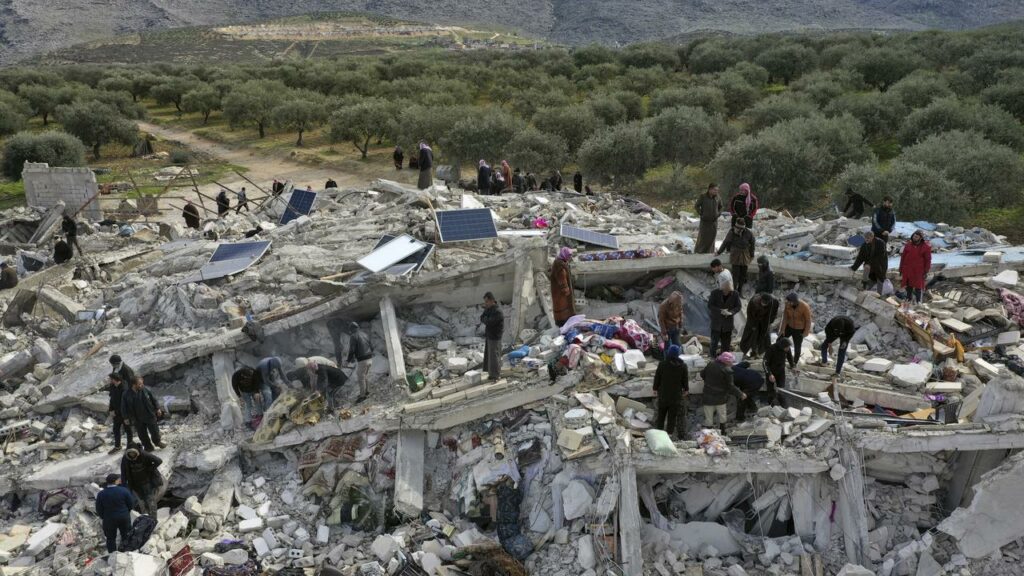Turkey-Syria earthquake death toll surpasses 5000
Ece Toksabay and Huseyin Hayatsever |

Overwhelmed rescuers are struggling to save people trapped under the rubble as the death toll from a devastating earthquake in Turkey and Syria rose past 5000, with despair mounting and the scale of the disaster hampering relief efforts.
The magnitude 7.8 quake – Turkey’s deadliest since 1999 – hit early on Monday, toppling thousands of buildings including many apartment blocks, wrecking hospitals, and leaving thousands of people injured or homeless in Turkish and Syrian cities.
In the Turkish city of Antakya near the Syrian border, where 10-storey buildings had crumbled onto the streets, Reuters journalists saw rescue work being conducted on one out of dozens of mounds of rubble.
The temperature was close to freezing on Tuesday as the rain came down and there was no electricity or fuel in the city.
Turkish authorities say some 13.5 million people were affected in an area spanning about 450 kilometres from Adana in the west to Diyarbakir in the east, and 300km from Malatya in the north to Hatay in the south. In Syria, authorities have reported deaths as far south as Hama, some 100km from the epicentre.
In Turkey, the death toll climbed to 3419 people, Vice President Fuat Oktay said, adding that severe weather was making it difficult to bring aid to the regions.
In Syria, where the quake did further damage to infrastructure already devastated by 11 years of war, the death toll stands at just over 1600, according to the government and a rescue service in the insurgent-held northwest.
Freezing winter weather hampered search efforts through the night.
Ankara declared a “level 4 alarm” that calls for international assistance, but not a state-of-emergency that would lead to mass mobilisation of the military.
Turkey’s Disaster and Emergency Management Authority (AFAD) said 5775 buildings had been destroyed in the quake, which had been followed by 285 aftershocks, and that 20,426 people had been injured.
The World Health Organisation was especially concerned about areas of Turkey and Syria where no information had emerged since the quake struck, its chief said.
“It’s now a race against time,” said WHO Director General Tedros Adhanom Ghebreyesus.
“Every minute, every hour that passes, the chances of finding survivors alive diminishes.”
In the Syrian city of Hama, Abdallah al Dahan said funerals of several families who perished were taking place on Tuesday.
“It’s a terrifying scene in every sense,” said Dahan, contacted by phone.
“In my whole life I haven’t seen anything like this, despite everything that has happened to us,” he added. Mosques had opened their doors to families whose homes were damaged.
The death toll in Syrian government-held areas rose to 812, the state news agency SANA reported.
In the rebel-held northwest, the death toll was more than 790 people, according to the Syrian civil defence, a rescue service known as the White Helmets and famous for digging people from the rubble of government air strikes.
“There are lot of efforts by our teams, but they are unable to respond to the catastrophe and the large number of collapsed buildings,” group head Raed al-Saleh said.
A top United Nations humanitarian official in Syria said fuel shortages and the harsh weather were creating obstacles to its response.
“The infrastructure is damaged, the roads that we used to use for humanitarian work are damaged, we have to be creative in how to get to the people,” UN resident coordinator El-Mostafa Benlamlih told Reuters from Damascus.
The earthquake was the biggest recorded worldwide by the US Geological Survey since one in the remote South Atlantic in August 2021.
Poor internet connections and damaged roads between some of the worst-hit Turkish cities, homes to millions of people, hindered efforts to assess the impact and plan help.
With tight elections scheduled in three months, President Tayyip Erdogan’s government faces a likely multi-billion-dollar reconstruction challenge just as he was ramping up his re-election campaign.
The economy, already strained by inflation at 58 per cent, is expected to grow a bit less than previously expected this year, analysts say.
Reuters